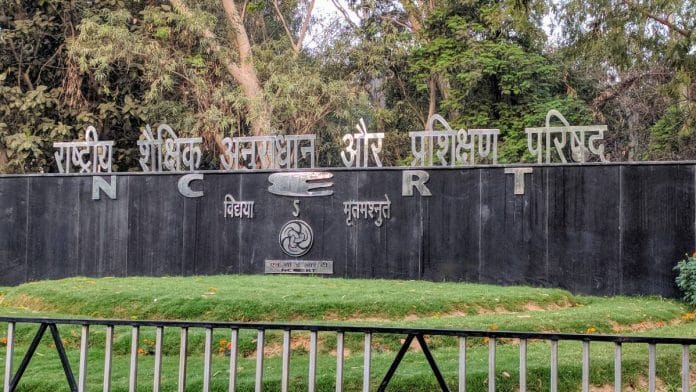New Delhi: The debate around the National Council of Educational Research and Training’s (NCERT) rationalisation exercise has renewed itself with some academics now speaking in its favour.
Mere two days after 33 academics and former members of the Textbook Development Committee expressed concerns about the removal of sections from political science school textbooks and requested the removal of their names, another group of professors and academics Friday said the former group was attempting to “impede the implementation of the National Education Policy (NEP 2020) and hinder the updating of NCERT textbooks”.
The defending professors have argued that because the NCERT textbooks have not been updated since 2006, the demand by the 33 professors shows their intent to have “students continue to study from 17-year-old textbooks rather than updated textbooks in sync with contemporary developments and pedagogical advancement.” They added that it “reveals intellectual arrogance”.
The statement, released on social media, defending NCERT has been supported by over 100 academics, which include the likes of Professor Santishree Dhulipudi Pandit, vice-chancellor of Jawaharlal Nehru University (JNU); Professor Dhananjay Singh, member secretary, Indian Council of Social Science Research (ICSSR); and Professor E. Suresh Kumar, vice-chancellor, English and Foreign Languages University and member, University Grants Commission (UGC), among others.
Why It's Imperative to Debunk the Propagandist claims of certain academicians: Why NCERT's Rationalisation of School Syllabus is an Academic Necessity! pic.twitter.com/NnZvIBUKpl
— Dhananjay Singh (@DhananjayaJnu) June 15, 2023
Also read: Scripture lessons, but eye on job market too: What DU’s new Hindu Studies course will be all about
What Wednesday’s letter said
In a letter written to NCERT director Dinesh Saklani Wednesday, 33 members of the Textbook Development Committee had asked for their names to be removed from classes 9-12 political science textbooks.
They had said that the “decision of who decides what is unacceptable and what is desirable has been kept rather opaque, violating the core principles of transparency”.
Their letter had come only days after the chief advisors of the textbook Suhas Palishkar and Yogendra Yadav had asked for their names to be removed from the textbooks because, they stated, it had been “mutilated beyond recognition”.
In Wednesday’s letter, the experts had contended that while NCERT may have intellectual property rights over textbooks, it does not have the “liberty to make substantive changes, minor or major, and then claim that the same set of contributors and chief advisors continue to be responsible for the revised text as it now stands”.
Responding to this, the press statement by the academics defending NCERT’s rationalisation exercise said, “As regards the decision of who decides what is unacceptable and what is desirable, it is argued that every new generation has the right to make additions/deletion to the existing knowledge base.”
It also accused the 33 scholars of spreading “misinformation, rumours, and false allegations” in their attempt to derail the implementation of the National Education Policy (NEP 2020) and disrupting the updation of NCERT textbooks.
UGC chairman Mamidala Jagadesh Kumar, too, took to Twitter to defend NCERT’s stance.
He wrote, “NCERT is fully justified in carrying out the rationalisation of its textbook contents. NCERT has repeatedly stated that the revision of textbooks originates from various stakeholders’ feedback and suggestions. NCERT has also confirmed that it is developing a new set of textbooks based on the recently launched National Curriculum Framework for School Education and that current textbooks in which the contents have been rationalised to reduce the academic load are only a temporary phase. Given this, there is no merit in the hue and the cry of these ‘academicians’…”.
In the recent past, the attacks by some "academicians" on NCERT for revising the textbooks are unwarranted. The current textbook modifications are not the only ones carried out. NCERT has been revising textbooks from time to time in the past too.
— Mamidala Jagadesh Kumar (@mamidala90) June 16, 2023
New books with “rationalised” syllabus were introduced in schools around the country with the start of the new academic session in April. As part of the “rationalisation” exercise, NCERT removed some content from the history and political science textbooks for classes 6 to 12 — including portions on Mahatma Gandhi’s assassination and a past ban on the Rashtriya Swayamsevak Sangh (RSS), the Bharatiya Janata Party’s ideological fountainhead — which had created controversy.
NCERT followed due process, can make changes
Defending the rationalisation, professors have said that the deletions did not lead to any “epistemic rupture in the existing domain of knowledge” but only reduced the content of the course as per contemporary knowledge need.
The letter written Wednesday had academics questioning NCERT’s move to make the changes without consulting them. They said that the revisions raised questions on academic freedom, pedagogic integrity, and institutional propriety.
In the letter made public Friday, professors have said that the Director NCERT had clarified to them that a rigorous process was followed to maintain a high level of standards with regard to these issues.
They also vouched for the credibility of the committees that made the changes by saying, “Unlike the selection process of authors in the previous times, the selection process this time was far more transparent and ethically justified.”
(Edited by Zinnia Ray Chaudhuri)
Also read: ‘Can’t hide behind our names’: Yogendra Yadav, Suhas Palshikar hit back at NCERT amid textbook row






